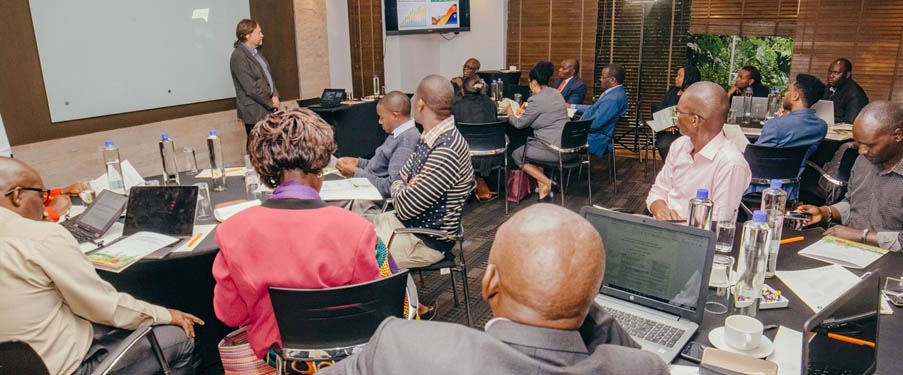
What drives transformations to sustainability? Some reflections from recent discussions in Nairobi
by Andy Stirling, Nov 2019
In October 2019, the Africa Sustainability Hub at the African Centre for Technology Studies (ACTS) in Nairobi organised an unusually lively, thought-provoking and inspiring event tackling exactly these thorny questions. This first in a three-part series of blogposts reflects on some issues raised.
Building on research undertaken by a collaborative International Science Council research project on ‘Governance of Sociotechnical Transformations’, the Nairobi discussions were nuanced, energetic and challenging – carefully interrogating well-worn tropes around what is becoming the increasingly globally pervasive buzzword of ‘transformation’. This active, serious, sceptical attention was a welcome tonic to a growing prevalence in this area, of tired, self-serving, bureaucratic jargon.
Including researchers, teachers, students, activists, business-people, consultants and policy makers covering a broad range of sectors and a wide diversity of perspectives, the Nairobi workshop put the spotlight in particular on loudly-touted prospective transformations in ‘smart cities’, ‘sustainable agriculture’ and ‘zero carbon energy’. In Kenya (as more widely), each of these fields is currently a vibrant arena for contending visions for how transformations might best be imagined and enacted.
Although a wary eye was maintained on rapidly-evolving developments underway in these sectors in Kenya, the scope of discussion was as fundamental in depth and as global in scope as it is possible to get. This was not one of those sadly-familiar meetings where ‘regional stakeholders’ find their scrutiny restricted to ‘national contexts’ or ‘implementation details’, for ‘building capacity’ to ‘roll out’ frameworks or programmes that are fixed in advance at a remote international level.
Indeed, repeated calls (and many commitments) were made in this Nairobi workshop to take these deliberations out of the usual policy cloisters in which even this meeting itself was also ensconced. Alongside academic and policy discussions, what is needed (many participants emphasised) are actions to open doors, build platforms and join up with energetic movements for transformation outside policy and academia – grounded in the wider, deeper worlds of life, work and culture.
Participants in the Nairobi meeting thereby repeatedly recognised that their own privileged roles in ‘transformation’ debates, bring heavy responsibilities. The main challenge for those who are ‘invited in’, after all, is not to claim to speak for those who are excluded… still less to drive transformations for others. There are obligations actively to open up deeper and wider political spaces for those many other interests and perspectives who are not invited, to speak and act for themselves.
So, as with the endpoints of transformation, perhaps likewise with the processes? In place of the presumptuous language of ‘policy entrepreneurs’, ‘transformational leaders’ or ‘transition visionaries’, progressive hopes arguably lie in a less hubristic idiom? Otherwise, a hierarchically stratified medium may easily become the message – with progressive efforts co-opted as yet another justification for precisely the elite privileges and structures of appropriation that are so deeply implicated in the problems that transformations to sustainability are trying to resist?
So here, it is arguable that those with progressive aims should not be restricted to cultivation of ‘transformation champions’ or ‘bridging professionals’ (no matter how well-intending). The priority for the more radically emancipatory values of sustainability itself, arguably lie in more distributed struggle for the general conditions of collective action that make individual interventions possible.
What the workshop brought to light, is that the ways to do this are many and varied – and only rarely highlighted in conventional practice of policy research for ‘evidence based’ decisions. By contrast with the supposed linear sequence from expert knowledge production to specialist policy implementation, a key point here is that ‘knowledge is action’. And ‘action shapes knowledge’ at least as much as other ways around. Transformations roll knowing and doing inseparably together.
Contrasting then equally with vertical controlling visions of ‘cockpits’ and ‘dashboards’ for ‘transition management’, this is how progressive transformations may emerge far more readily in horizontal mutualism and caring. Here, a multiplicity of strategies and tactics have long been practiced by social movements – like ‘trojan horses’, ‘institutional judo’, ‘monkeywrenching’ and ‘political contagion’. This less hubristic kind of political body language can guard against structural appropriations of transformation processes by elite and incumbent interests enjoying greatest access to patronage.
A more emancipatory focus for privileged progressive actors with interests in transformation, then, arguably lies not in ‘extracting’ and ‘translating’ specific knowledges that allow others to be spoken for. The priority instead lies in building more general institutional means for excluded knowledges to accredit and assert themselves. This is how associated voices and interests can be heard directly, of the marginalised groups who otherwise remain largely uninvited to the noisy ‘transformation party’.
After all, despite being signed up to by 190 countries and pinned to some three hundred metrics and targets, the crucial global imperatives around social justice and environmental protection upheld in the Sustainable Development Goals are – despite being bedded into global policy debates at the highest levels – neither just a technical matter for specialists, nor a creature purely of the privileged policy institutions in whose documents the logos and graphics proliferate.
Carrying forward the cause of ‘progressive transformation’ from the Brundtland Report thirty years ago, the ‘Global Goals’ encode (if patchily) key ambitions of timeless grassroots struggles. If elite global policy making is the hard-worn beach on which these waves of emancipatory politics have repeatedly crashed, then the resulting institutions, practices and metrics of sustainability can be seen as the high level ‘strandwrack’ of this cumulative energy of progressive global mobilisations – the institutional flotsam and jetsam left by social movements on the ever-changing shores of history.
Tho’ disappointing as an end in themselves then, it is these scattered features in elite level global politics that currently help give traction for the longstanding ambitions of sustainability movements to ‘transform our world’ and ‘leave no-one behind’. Rather than seeing the many imperfections as betrayals, they might be seen instead as crucial opportunities for onward collective struggle.

